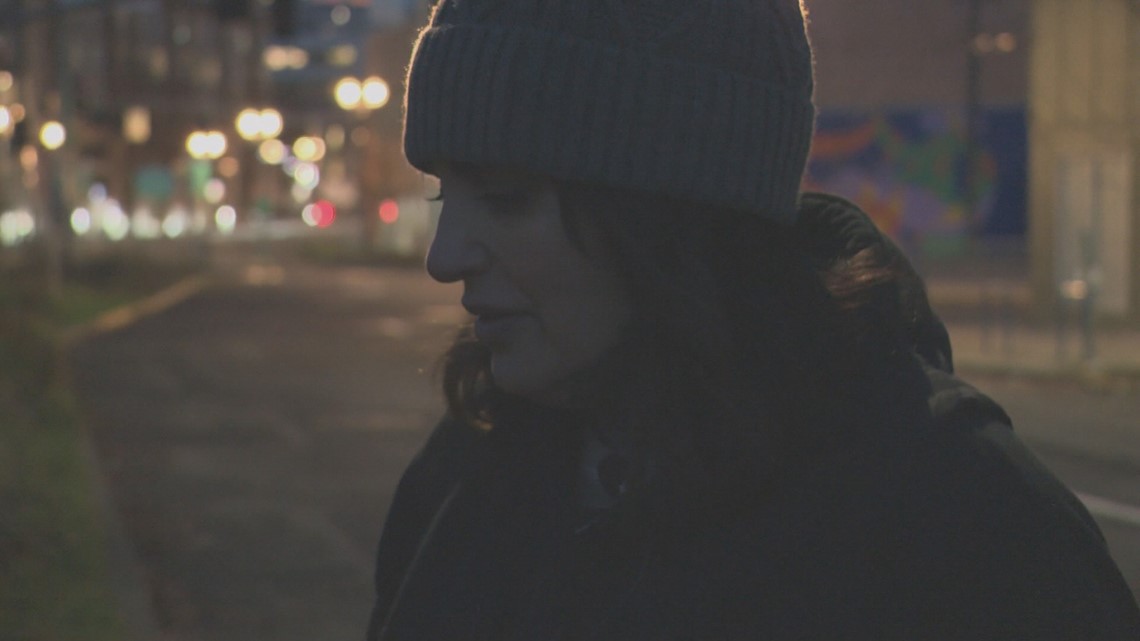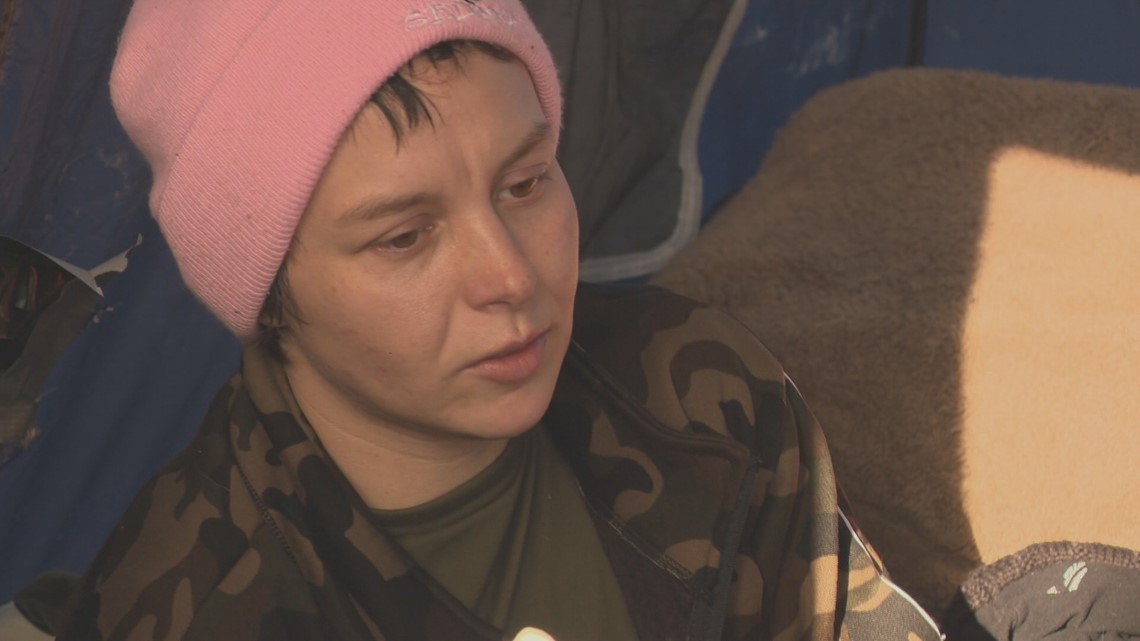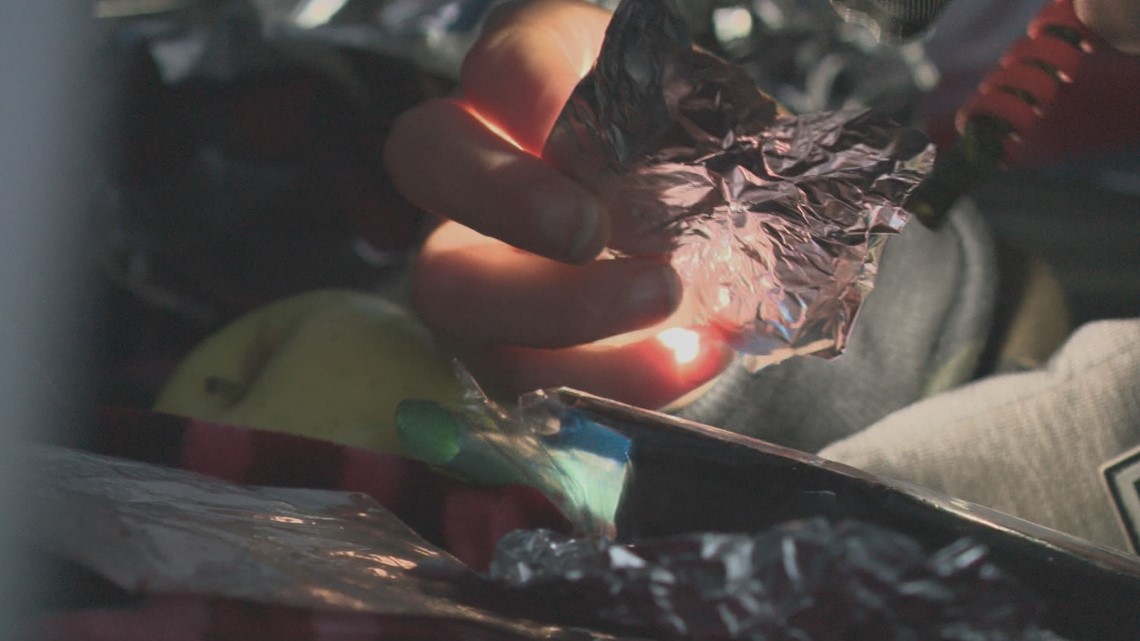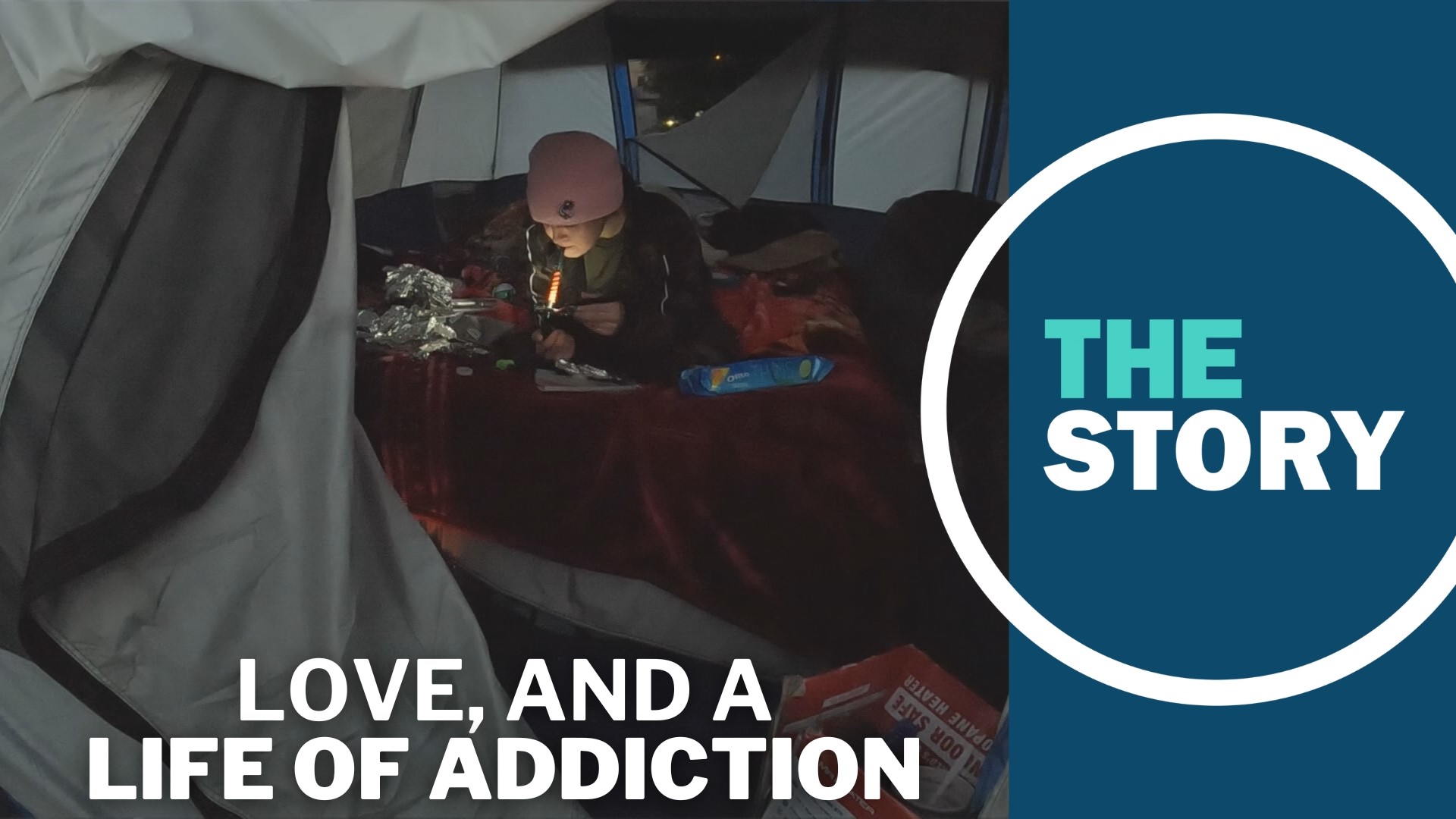PORTLAND, Ore. — As a mom, Shannon Starr can only hope that she's doing the right thing for her daughter. Today, that means buying food — macaroni salad.
"I'm just doing what I can," Starr says. "I'm trying to save my daughter's life. And there's still no pamphlet, there's no rules in life on how to be a parent."
KGW reporter Blair Best first met Starr in July. She'd traveled to the city from Arizona to search the streets of Portland for her daughter, 29-year-old Jade.
'PORTLAND SUCKED THE LIFE OUT OF HER': Mother searches downtown Portland for her homeless daughter
Jade moved to the city four years ago. She lost her apartment after getting hooked on fentanyl, and she's been homeless ever since.
"She was living downtown, basically 'Tent City,' started to befriend some of the people downtown ... and I guess someone gave her her first blue pill," Starr told KGW at the time.
On that occasion, it took Starr about a week of searching to track Jade down. After that, she packed up and moved to Portland full-time.
Most days, Starr said, she feels completely helpless.
"There's not much I can do other than, like I said, leave her alone — act like she's not there anymore, and let her hit complete rock bottom," Starr explained, "which to me is death, is me attending her funeral, so I'm not going to pretend she's not still alive."
She delivers the food she bought to a tent off Southwest 5th and Lincoln that Jade shares with her boyfriend "Z," enough food for both of them. The tent sits right across the street from Starr's apartment.
Jade said that they moved to this spot because it's closer to her mom and because it's a safe space to make camp.
"She needs laundry done, so I'll go down there, I'll grab whatever laundry she needs done," explained Starr.


Foraging for fentanyl
It's around noon, and Jade is just waking up. It's almost time for Z to head out.
"He goes out and gets supplies for us," Jade explained. "Obviously, our medication — our drugs."
Jade remains behind in the tent while Z goes out to score. She said that it's the safer option.
"It's hard being a girl out here," she said. "People are pretty much asking you to trade sexual favors for drugs at this point."
The drug market has changed lately for Jade and Z. Police have cracked down on the fentanyl trade, and the couple's usual dealer is in jail.
"He was somebody that I had a working relationship with for a long time, so that worked in our favor to where we could get it really cheap," Z said. "And so now, we pay the same price as everybody else pays — and it's pretty expensive."
The cost is about $80 a day. Z said that he gets the money from selling electronics; he has a bag of them sitting next to him. He wouldn't say where they came from.
"It's like $40 a gram, and it takes us like a couple of grams to stay well," he added.
Both Jade and Z have built up a tolerance to the cheaper fentanyl pills, the ubiquitous blue counterfeit oxycodone pills stamped with "M30." They now smoke fentanyl in its purer, powdered form.
"It's kind of like relaxing, like your body is just feeling content," Jade said, describing what it's like to smoke fentanyl.
Jade and Z share a kiss goodbye. Jade said that sometimes Z will be gone for hours — recently, he disappeared for a day and a half. She said that she can go about 20 hours without any fresh product, but after that, she starts to get the "hot sweats" and finds it difficult to move.
"When you're in the struggle, yeah, every little bit counts," Jade said.


She rifles through stacks of crumbled foil crusted with baked-on fentanyl residue. She manages to scrape off enough for five hits — enough to last her about two hours. She tells Best that she doesn't know what she'd be doing with her time if she wasn't doing drugs.
"I went to school for health coaching," Jade said, laughing ruefully. "I didn't think it was going to end up going this route ... Life is really hard when you think about going back to work and going into, like, another motion."
Jade said that she isn't ready to sober up, she was sober three years ago — she's been there, done that. But, she admits that she feels stuck in a rut, even if it's not rock bottom.
How do you help someone who doesn't want help?
Dr. Olivia Rae Wright specializes in family and addiction medicine at OHSU. To her, there's nothing unfamiliar about Jade's story.
"She's the classic person whose brain has been affected by prolonged use, and she really does need it to feel normal," said Wright.
People with an addiction of this kind feel like nobody understands them, Wright said — and the truth is, few do. It's difficult to understand what addiction does to the brain, which she said is why society tends to be so judgmental about substance use.
"We think you're just weak, but that's not it," Wright said. "The brain controls everything we do, and if we're messing with those pathways, we're causing a different kind of damage than most people have experienced."
Jade's mom, Shannon Starr, seems to know this — that judgment isn't helpful. But is it possible to help someone who doesn't want to help themselves?
"You really can't," Wright said. "I think the trick is to get them to want to help themselves. The things I've seen most effective are families who love them — not waiting 'til they hit rock bottom, because rock bottom with fentanyl is death."
Being there
"What's a parent to do, you know?" asked Shannon Starr. "Some days, I just want to cry after I leave because I know there's nothing I can do but just to give her love constantly."
It's now 5 p.m. and Z hasn't returned to the tent yet. Jade pulls out her pile of used tin foil, scanning it with a flashlight amidst the darkness. It's a last resort to fend off withdrawal.
"The initial withdrawal is really miserable — shaking and sweating, feeling like you can't sit still, diarrhea, vomiting — but after a few days, those symptoms start to subside," said Dr. Wright. "And then what they are left with is this overwhelming feeling of gloom and this craving to get normal and realizing the only thing their brain is telling them that will help them get back there is more of the drug."
Jade thinks there might be a hit or two left on the pieces of foil that she'd missed earlier.


"This is the sad part," said Starr. "Knowing that she's almost out of drugs."
It's a hard time, Jade acknowledges. But it's hard for her mother, too. She doesn't want to see what's being illuminated by the flashlight in the darkened tent.
"I really just try not to focus on the drugs at all and just focus on our relationship and reminding her that I love her," Starr said. "That's about it."
They both say that they love each other as Starr leaves for the night.
Epilogue
A few weeks after this day-in-the-life of Jade and her mother, reporter Blair Best returned to the tent with Starr — hoping to try one more time to connect Jade with treatment or housing. Jade said that she wanted to find a place indoors, but she didn't want to give up smoking fentanyl.
Best managed to hook Jade up with a spot at the first Temporary Alternative Shelter Site, a large city-sanctioned camp in Southeast Portland. The site is low-barrier, which means that residents don't have to be sober to get a place inside. She was able to move in the next day.
Though Jade spent several weeks at the site, Starr said on Monday that she and Jade had gotten into an argument and her daughter left the shelter. It's unclear if Jade has since returned to the streets or if she will go back to the shelter site — or if there will still be a bed available there if she does return.

